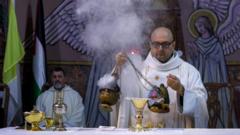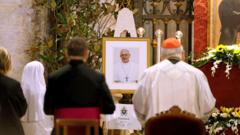Mourning for Pope Francis is being observed globally as his funeral is set for Saturday, featuring simpler rituals and tributes from across nations.
**Pope Francis to be Remembered in Modest Funeral, Mourners Gather Globally**

**Pope Francis to be Remembered in Modest Funeral, Mourners Gather Globally**
The funeral of Pope Francis, who passed away at 88, will be a simpler ceremony, reflecting his humble approach during his papacy, with worldwide memorials taking place.
The Vatican has announced that Pope Francis’ funeral will occur on Saturday in front of St. Peter’s Basilica in Rome. The ceremony will embrace a simpler format that reflects the humble and informal style that Francis emphasized throughout his papacy. Cardinal Giovanni Battista Re is set to preside over the funeral service, adhering to guidelines instituted by the late pontiff himself.
On Tuesday, Pope Francis' body was prepared for resting at Casa Santa Marta, the guesthouse where he had chosen to live since his election. Photographs released by the Vatican revealed the late pope in an open casket, clad in ceremonial vestments and clutching a rosary. Following the ceremony on Wednesday, his coffin will be transported to St. Peter’s Basilica for a public viewing, allowing mourners to pay their respects directly at his side.
Memorial services span the globe, with congregations gathering in cities from Sydney to Manila. Flags have been lowered to half-mast in acknowledgement of the papal passing in numerous countries including Italy, Brazil, and Argentina, honoring Francis’ legacy particularly in his homeland.
World leaders, including political and religious figures, plan to attend his funeral, which poses a logistical challenge, particularly with the attendance of President Trump. Following the announcement of Francis’ death, cardinals worldwide have begun congregating at the Vatican, initiating the transition to select the next pontiff—an event that happens privately within the College of Cardinals.
The Vatican confirmed that Pope Francis passed away from complications related to a cerebral stroke, which led to a coma and subsequent cardiovascular collapse. His will requested a simple burial at the Papal Basilica of St. Mary Major in Rome, emphasizing his modest lifestyle, which often included communal interactions over isolation.
During his tenure, Pope Francis was known for advocating on behalf of marginalized communities, particularly migrants, and championed contemporary issues such as climate change. He had a unique connection with grassroots movements and often involved himself in matters concerning human dignity.
As the world mourns, tributes and reflections on his life continue. His death represents a significant loss for many, especially within minority communities who felt heard and supported under his leadership. The upcoming days will see continued global observance and preparation for the cardinals’ conclave to elect a new leader for the Roman Catholic Church.
This moment marks not only the end of Francis' papacy but also the beginning of a new chapter for the Catholic Church as it seeks a successor who will continue his work while navigating the complexities of modern faith.
On Tuesday, Pope Francis' body was prepared for resting at Casa Santa Marta, the guesthouse where he had chosen to live since his election. Photographs released by the Vatican revealed the late pope in an open casket, clad in ceremonial vestments and clutching a rosary. Following the ceremony on Wednesday, his coffin will be transported to St. Peter’s Basilica for a public viewing, allowing mourners to pay their respects directly at his side.
Memorial services span the globe, with congregations gathering in cities from Sydney to Manila. Flags have been lowered to half-mast in acknowledgement of the papal passing in numerous countries including Italy, Brazil, and Argentina, honoring Francis’ legacy particularly in his homeland.
World leaders, including political and religious figures, plan to attend his funeral, which poses a logistical challenge, particularly with the attendance of President Trump. Following the announcement of Francis’ death, cardinals worldwide have begun congregating at the Vatican, initiating the transition to select the next pontiff—an event that happens privately within the College of Cardinals.
The Vatican confirmed that Pope Francis passed away from complications related to a cerebral stroke, which led to a coma and subsequent cardiovascular collapse. His will requested a simple burial at the Papal Basilica of St. Mary Major in Rome, emphasizing his modest lifestyle, which often included communal interactions over isolation.
During his tenure, Pope Francis was known for advocating on behalf of marginalized communities, particularly migrants, and championed contemporary issues such as climate change. He had a unique connection with grassroots movements and often involved himself in matters concerning human dignity.
As the world mourns, tributes and reflections on his life continue. His death represents a significant loss for many, especially within minority communities who felt heard and supported under his leadership. The upcoming days will see continued global observance and preparation for the cardinals’ conclave to elect a new leader for the Roman Catholic Church.
This moment marks not only the end of Francis' papacy but also the beginning of a new chapter for the Catholic Church as it seeks a successor who will continue his work while navigating the complexities of modern faith.





















